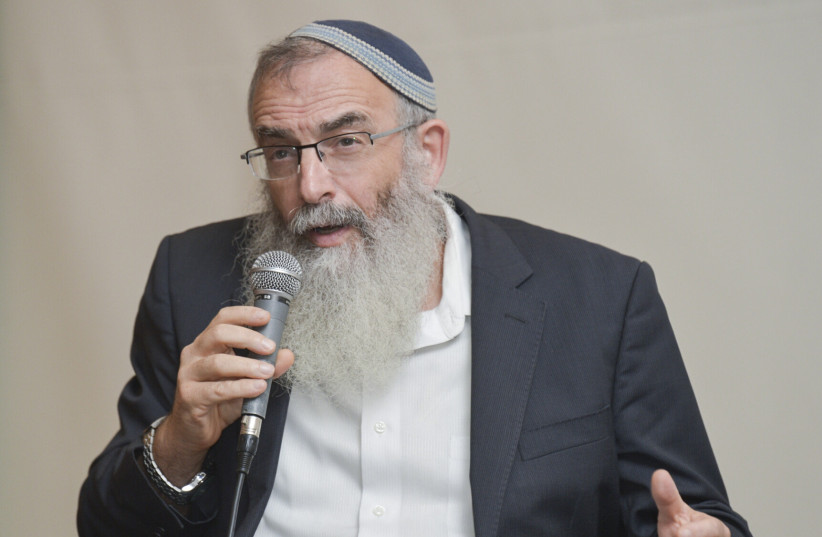Senior religious Zionist rabbis Yuval Cherlow and David Stav, heads of the Tzohar rabbinic organization, wrote on Wednesday evening that there should be an investigation into the claim that rabbi Zvi Thau sexually assaulted several women and minors over the years, a claim made by several women a few months ago.
Later on Thursday, Channel 12 reported that an investigation was opened by Israel Police into the allegations against Thau. The allegations, one of which was publicized in a Facebook post back in August, did not receive much j ournalistic attention at the time. Cherlow and Stav’s addressing of the allegations grants more weight to them and could shift the course of events.
The 84-year-old rabbi, co-founder and president of the Har Hamor yeshiva based in the Har Homa neighborhood of Jerusalem, is one of the most prominent rabbis in the religious Zionist community. Thau is also the spiritual leader of the Noam faction, headed by Avi Maoz, of the Religious Zionist Party (RZP) in the Knesset.
Allegations against Thau
IN AUGUST, Nechama Teena, a resident of the Kiryat Arba settlement, alleged in a Facebook post that Thau sexually assaulted her when she was a minor.
“It took me almost 30 years to be able to tell the truth.”
Nechama Teena
Teena said that she is a 38-year-old divorced woman and mother of five children. “It took me almost 30 years to be able to tell the truth,” she wrote, adding that the publications of sexual assault and rape by rabbis and leaders – such as haredi (ultra-Orthodox) author Chaim Walder, who committed suicide following allegations against him – and the harsh response of Safed Chief Rabbi Shmuel Eliyahu, have convinced her to share her story.

“I know how small the chances are that my voice will be heard, and yet, after so many years of silence, I choose to voice it,” Teena wrote.
She added a photo of Thau to the post, identifying him as the perpetrator. “It is not yet the time to tell how and in what manner, but it is the time to say out loud: Rabbi Thau sexually assaulted me as a minor.”
Teena said that, “when I tried to raise my voice, he threatened me; this is not yet the time and place to tell how.
“I know how weak my voice is compared to the other voices; I know how many women on so many fronts are fighting and paying prices in the war for the truth. But this is my story, and this is my life, and it is the truth. Now is the time to hear it,” she said.
“This person, in the picture, who has so much power and countless people [working] under him, hurt me, and I’m sure I’m not the only one,” Teena said, sharing in August that she passed a polygraph test, contacted the police and had an article filmed that was supposed to be published the day before, but “due to the force that his man has and used, it has not yet been published.”
Most Israeli media outlets did not run a story about her post in August.
Teena invited rabbis and leaders of the religious community to meet with her, prompting this latest wave of attention to her story.
“We cannot remain silent when considerations of personal comfort and appearance cause the voice of these women not to be heard.”
Rabbi David Stav
“FOR SEVERAL weeks now, I have been agonizing over the question of whether it is right to publicly address the claims made by a number of women regarding serious sexual abuse by an important rabbi in [the community],” Stav wrote.
“It is the duty of the police to investigate the complaints impartially – no one disagrees with that. There is also no one to dispute the presumption of innocence of the suspected rabbi or to impose judgment without a trial.”
Stav wrote that he was silent until now because he didn’t have enough information at hand to address the matter. But over the last few days, he wrote, he “spoke with one of the complainants and she told me about the difficulties she is faced with, by various bodies, to which she turned in order to clarify her complaints.”
Some of these organizations, according to Stav, are afraid to help her because of older conflicts.
The role of the rabbis is on the side of the oppressed
STAV STRESSED that he has “come to the conclusion” that he has “no choice.”
“We cannot remain silent when considerations of personal comfort and appearance cause the voices of these women not to be heard,” he said.
“The role of rabbis, in all generations, was to stand on the side of those who were attacked, injured or weak, against those in power,” Stav wrote.
The testimonies shared with him, “through a conversation with one of the complainants and a photographic testimony of another complainant,” are “extremely serious.”
“Of course, this is only one side, and I have no tools to determine whether the claims are justified or not,” he said, concluding that “only a vigorous investigation carried out by an orderly body will be able to create the necessary balance.”
Cherlow wrote that “the women who claim to have been harmed have the right to make their voices heard and to demand, first and foremost, that their words be recognized.” He stressed that “Rabbi Thau is entitled to the purification of his name and to claim that things he did not do shouldn’t be alleged against him.”
Cherlow also met with the complainants. “Their words are very sharp and clear,” he said, agreeing with Stav that he has “no tools to know what really happened, since, like everyone else, I have not heard both sides.”
